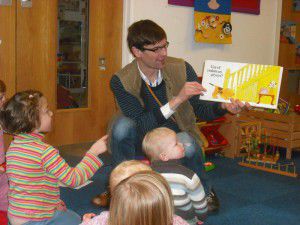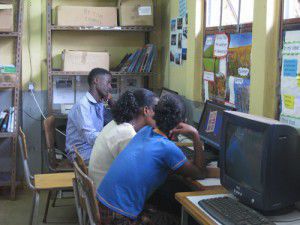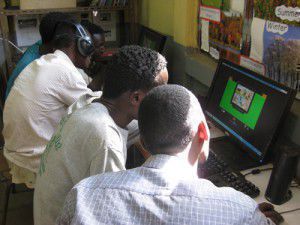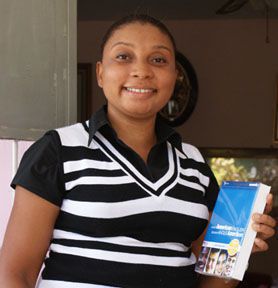The benefits of exposing younger children to multiple languages
Today we have a guest post by Stephen Thomas, on behalf of Pearson PTE, on why it’s important to expose children to other languages at a young age.
Why expose children to other languages?
Communication is fundamentally part of what makes us unique organisms on earth. The way that we have developed language to exchange concepts, ideas, narratives and so on with sounds that are culturally recognised to the degree of complexity we have, is distinctive and unmatched by any other organism.
Clearly then, learning a language reaps obvious benefits: we can learn and understand new things with ease, retain ideas throughout decades, make each other laugh and cry, discuss, debate and develop the most fundamental questions of philosophy – all through using just one language. So aside from the want or need to communicate with speakers of a different language, is there any benefit of being bilingual or raising children that are bilingual? Well, Pearson PTE spoke with Dr Catriona Morrison, senior lecturer in psychology at The University of Leeds who advised that there is evidence to support the notion that merely exposing children under the age of five to other languages has benefits, regardless of whether or not they become bilingual.
Between the age of 3 and 6 is a vital stage of childhood in terms of language learning and development. The malleable mind of a child
at this age is like a sponge and Dr Morrison advises that “after the age of five, it is highly unlikely to acquire the mother tongue of a language if it is not yet already acquired”. Although in later childhood or adult life we may learn a new language, we can be sure that we do not learn it with anything like the same ease that we would as a child. After this crucial point in child development there begins a change in the human brain that effectively shuts down the ability to ‘naturally’ learn language. Of course that doesn’t mean you can’t learn a language in adulthood, but if you have, I’m sure you will agree that it is much more difficult in contrast to a truly bilingual person (who learned two languages before this crucial stage) whereby the two languages are seamlessly managed within the brain as though they were one.
Beyond the communicative advantages, research suggests that bilingual children have better capacities for storytelling and interpretation. The processing of information seems to happen at a deeper level and they will think through and into the story more. So for example, statistically if we were to take a group of monolingual children and a group of bilingual children and tell them a story, when we ask them to recount the narrative and characters, the bilingual children will show evidence of deeper understanding and a higher level of information processing.
Furthermore, Dr Morrison suggested that bilingualism seems to act as a preventative mechanism against the onset of dementia or Alzheimer’s disease. Although it will not create immunity and one may still fall to the condition, statistically if it is going to happen it will happen later in life, when compared to monolingual sufferers. In layman’s terms this could be because one is using more of the brain when accessing two or more languages and thus the brain is more active, and an active mind is a healthy mind.
How can we help children to discover languages?
So if you are a monolingual parent and you see the benefits of bilingualism in younger children, how should you go about helping your child? Realistically, a child of monolingual parents isn’t going to become bilingual, even with partial immersion in other languages through accessing foreign television radio or sending them to a nursery that caters for multiple languages. This is why Dr Morrison agrees that it is such a tragedy that the UK’s schooling system doesn’t introduce children to other languages as it is at this vital time of youth that we have the change to expand their minds in a way that isn’t possible at any other stage of life.
However, this doesn’t mean that the exposure is pointless or irrelevant: “I have a lot of faith in the idea that the more languages a child is exposed to, the better,” says Dr Morrison. Part of what makes language learning hard is that a new language draws on an entirely alien phonemic inventory to what we are used to hearing. When we try to listen to and learn these sounds, our brain simply isn’t accustomed to hearing them. So there is definitely a benefit for parents endeavouring to expose children to these sounds that they would otherwise be starved of and therefore selectively excluded from the brain; absolutely do allow your children to watch foreign TV shows or listen to internet radio form other countries and if possible encourage human interaction with your child and other language speakers. This will only help and bolster their learning and development.
Stephen Thomas
If you’d like your children to start learning a language, why not try our Vocabulary Builder program? With its colourful characters and fun games, it’s a great start for young learners – and it’s available in over 100 languages.
Join the revival – learn Cornish
Today we have a guest post from Elizabeth Stewart, from the Cornish Language Partnership, on why Cornish is a great language to learn.
The Cornish language, or Kernewek as it is known by those who speak it, is enjoying a hugely successful revival. Those who are fortunate enough to live in the Duchy, or visit it on holiday, have only to look around them to see proof of this, with bilingual road signs springing up on street corners and businesses proudly asserting their origin by naming their products in Cornish. It’s an exciting era for the language, and learning has just become easier and more enjoyable with the release of three new EuroTalk resources in Cornish.
Cornish is a Celtic language and is most closely related to Welsh and Breton, though it also has strong links to the other Celtic languages of Irish Gaelic, Scots Gaelic and Manx. Up until the mid sixteenth century it was the main language spoken across Cornwall but pressure from English caused Cornish to decline and retreat to the far west. By the beginning of the nineteenth century Cornish had all but died out as a community language, but in 1904 Henry Jenner published a Handbook of the Cornish Language which kick started the revival of Cornish as a living, spoken language.
Since then the number of people learning and using the language has escalated, with Cornish receiving official recognition as a minority language in 2002 under the Council of Europe’s Charter for Regional or Minority Languages.

Skol Veythrin Karenza - Pre-school in Pool (photo Emilie Champliaud)
Today Cornish is one of the fastest growing languages in the world, and this is set to accelerate with more schools than ever choosing to teach Cornish, from pre-schools (including a fully bilingual one that teaches through the medium of both Cornish and English) right through to secondary schools.
Businesses are also embracing the use of Cornish. Local enterprises such as Polgoon Vineyard have made a point of choosing Cornish branding as a mark of local origin and several of their products are named in Cornish. Meanwhile national companies such as JD Wetherspoon have a policy of putting up bilingual signage in their Cornish pubs, as well as giving them names in Cornish such as “Try Dowr” (Three Rivers) in Truro and “Chapel an Gansblydhen” (Centenary Chapel) in Bodmin.
Cornish is also used in the community, with Scouts and Guides learning their motto and promise in Cornish, gig rowers naming their gigs in Cornish and an increasing number of individuals using Cornish for everything from house names to children’s names, wedding vows to tattoos.
If you would like to join the growing number of people who are taking an interest in Cornish, order your copy of either Talk More (suitable for adult beginners) or Talk the Talk (suitable for younger beginners) from EuroTalk today, or if you’ve already been learning for a while try taking your Cornish a bit further with Talk Business.
For more information about the Cornish language, visit www.magakernow.org.uk.
Encouraging English learners in Ethiopia
Our guest post today is by Elizabeth Horsefield, a volunteer with the VSO in Ethiopia.
Ethiopia was perhaps not the intended market for a EuroTalk Interactive Learn English CD-ROM. But it’s going down a storm. I work as a VSO volunteer in a Teacher Training College in a rural area of Western Oromia, Ethiopia. We have an English Language Improvement Centre (ELIC) which recently acquired two new desktop computers complete with headphones and speakers. Perfect.
 The students are desperate to improve their English. For most of them this usually involves sitting silently in front of an old copy of some estranged grammar book and making notes. Others even read the Oxford dictionary in the hope that it will one day magically transform their communication skills in English. Many of them went to school in remote areas with very few educational resources. Often their experiences in the ELIC provide a first opportunity to use a keyboard and mouse, so operating an interactive CD-ROM in their second or maybe third language might have been beyond their capacity. It would appear not.
The students are desperate to improve their English. For most of them this usually involves sitting silently in front of an old copy of some estranged grammar book and making notes. Others even read the Oxford dictionary in the hope that it will one day magically transform their communication skills in English. Many of them went to school in remote areas with very few educational resources. Often their experiences in the ELIC provide a first opportunity to use a keyboard and mouse, so operating an interactive CD-ROM in their second or maybe third language might have been beyond their capacity. It would appear not.
 Every afternoon (hours scheduled for computer use outside of their regular classes), the students come and learn. Sitting alone or in pairs, I allow them half hour slots to navigate around the different activities and keep score. The cultural context of the material is apparent. These Ethiopian students are not familiar with eating roast chicken, going sailing or playing the trombone. But this only serves to highlight how culture and language are two halves of the same whole and they are quick to overcome any misunderstandings with the help of the pictures and a little guidance from the native speaker (me).
Every afternoon (hours scheduled for computer use outside of their regular classes), the students come and learn. Sitting alone or in pairs, I allow them half hour slots to navigate around the different activities and keep score. The cultural context of the material is apparent. These Ethiopian students are not familiar with eating roast chicken, going sailing or playing the trombone. But this only serves to highlight how culture and language are two halves of the same whole and they are quick to overcome any misunderstandings with the help of the pictures and a little guidance from the native speaker (me).
The local language in the area I live and work is Afan Oromo. I have been making a concerted effort to speak and understand something of this wonderful language with its complex history and rich sense of identity. If only an interactive CD-ROM existed for Afan Oromo, I suspect I would be making nearly as much progress as my students.
Elizabeth Horsefield, Nekemte, Ethiopia
Innovative Language Learning Initiative for Haiti
Guest post by Sheri Colas-Gervais, Vice-President of the Le Flambeau Foundation
The launch of two new sets of language learning CD-ROMs has many excited. The new products are the result of a unique relationship between Le Flambeau Foundation – a U.S. non-profit organization providing educational programming and scholarships to youth in Haiti, and London-based EuroTalk. The new language learning CD offerings include the American English language learning set, which features special Haitian Creole help, and the Haitian Creole language learning set. Each set has five CD-ROMs. These are part of an innovative fundraising initiative designed to assist young people in Haiti to earn sustainable educational assets that will prepare them for the effective rebuilding of Haiti.
 These CD sets are unique in a number of ways. The special feature of having the help guides for the English language learning CDs spoken in Haitian Creole offers a significant advantage to the many youth in Haiti who speak Creole but are not fluent in French. By reducing the number of steps, students are able to accelerate their English learning… and have fun doing it via the highly entertaining and engaging EuroTalk format. For young people in Haiti looking for jobs and for those aiming to attend higher learning institutions in the U.S., this advantage is invaluable. It opens the door to a whole new world. The Haitian Creole learning CDs offer similar advantages to a U.S. audience (and other countries) aiming to become fluent before visiting Haiti and making sustainable contributions. We are pleased to be working with the EuroTalk team on this initiative and applaud the commitment. Sending the next student to school on scholarship, resulting from the funds being raised via this initiative, is already within reach. The future is bright!
These CD sets are unique in a number of ways. The special feature of having the help guides for the English language learning CDs spoken in Haitian Creole offers a significant advantage to the many youth in Haiti who speak Creole but are not fluent in French. By reducing the number of steps, students are able to accelerate their English learning… and have fun doing it via the highly entertaining and engaging EuroTalk format. For young people in Haiti looking for jobs and for those aiming to attend higher learning institutions in the U.S., this advantage is invaluable. It opens the door to a whole new world. The Haitian Creole learning CDs offer similar advantages to a U.S. audience (and other countries) aiming to become fluent before visiting Haiti and making sustainable contributions. We are pleased to be working with the EuroTalk team on this initiative and applaud the commitment. Sending the next student to school on scholarship, resulting from the funds being raised via this initiative, is already within reach. The future is bright!
The Le Flambeau Foundation assists Haiti via Intellectual Infrastructure Development – the provision of a solid education foundation for the brightest youth and future leaders of Haiti. The Foundation serves as a portal providing the youth of Haiti with educational opportunities, such as college scholarships and preparatory programming, that will prepare them to rebuild and lead the country’s transition from poverty to prosperity, with dignity. Le Flambeau Foundation scholars have a track record of graduating in the top tier of their class, including a scholar who is now attending graduate school at Harvard University. The Torch is lit. We carry it forward and pass it on!
The special CD sets are available to youth groups in Haiti and in the U.S. and serve as vehicles for meeting educational and funding needs. For more information on getting involved or on purchasing these special CD sets, please contact Le Flambeau Foundation Inc. (www.leflambeau-foundation.org) at scg@le-flambeau-foundation.org, or call (001) 305.596.2819. EuroTalk is making a donation to the Le Flambeau Foundation for every CD purchased from this special collection. This is innovation in its best form, as the wheels are in motion for making a significant sustainable difference for the people of Haiti. Rebuilding moves forward.

Example of a successful language exchange partnership which resulted in a student in Haiti receiving a scholarship. Both students remain involved and are excited about the new CDs, as these will increase access and accelerate the learning benefits.





